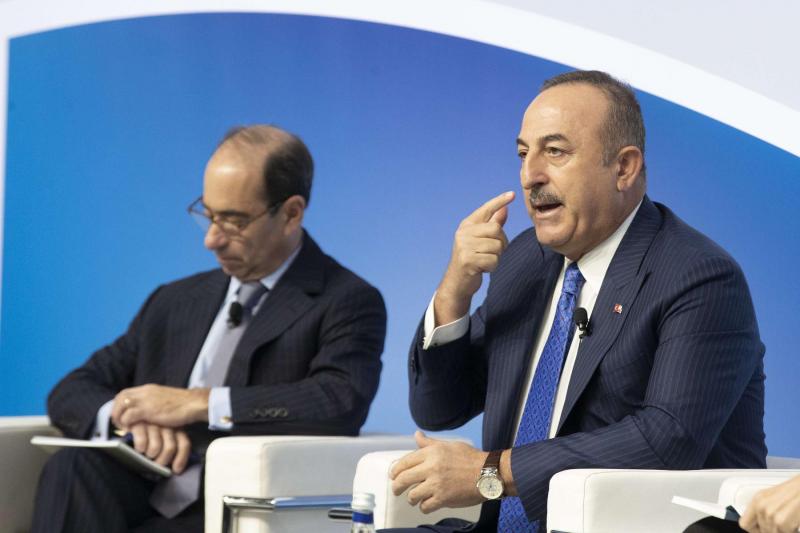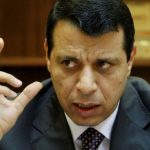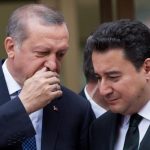In the public eye. Turkish Minister of Foreign Affairs Mevlut Cavusoglu (R) speaks at the Mediterranean dialogues conference in Rome, December 6. (AP)
I recently took part in a conference in Rome organised by the Italian Institute for International Political Studies and the Italian Foreign Ministry.
Titled “MED Mediterranean Dialogues,” the annual event attracts high-level attendees from across the region — ministers, decision-makers, think-tank figures, diplomats, analysts and journalists — to receive updates on issues that remain piled up and discuss ways to deal with them.
This is the third time I joined it and, as any journalist, found the exchange of ideas useful, despite that the critical approach seemed lacking in many panels and dialogues.
MED is often a testing ground for the pulse across the Mediterranean, where what’s being said exposes what’s not being said, telling enough about the defining spirit of the age in which we live. In this fifth gathering, the aim of the MED was exploring a “positive agenda” but there was not much of it to be found, no matter how much speakers tried.
One of those in attendance was Turkish Foreign Minister Mevlut Cavusoglu. Given the highly criticised role of Turkey in the escalation of Syria crisis, its confrontational approach to Greece and Cyprus and the interventionist policies in Libya, his message was highly anticipated. Overall, however, the conversation was an anti-climax because there was nothing new in the statements he made. The arguments and claims were repetitions of Turkey’s hard-line position.
There was, though, an interesting element regarding his session, which was scheduled for a specific time. Awaiting the appearance, I was giving an interview to the MED team, analysing the indisputable central role of Turkey in the growing turbulence, explaining the sharp changes in its foreign policy and why it has been widely perceived as “rogue” and threatening.
When the interview finished — just in time, I thought — I rushed to the large hall only to find, along with some other people, that it was over. The start time had been pushed up half an hour.
Two people asked me “are you the journalist that the Turkish minister wanted to block entering the hall?” They had heard that the Turkish delegation insisted that three people should be barred or else. It was, of course, a ridiculous demand; the capacity of the hall was more than 700 people and there would be no questions from the audience.
However, it was a fact, my Italian colleagues had it confirmed and the outrageous attitude found its way to reports in newspapers.
What Cavusoglu said in the session, per se, was not newsworthy but many questioned how the organisers responded to the Turkish side’s condition. After all, Ankara’s hostile attitude to journalists and its allergy to the free flow of information are well known. I was present as the editor of Ahval News, whose editorial independence and critical reporting Ankara apparently dislikes.
There was no information given me or my Italian colleagues what the official response to the Turkish delegation was and, in practice, the outrageous demand can be said to be met. “I am outraged and ashamed of allowing such behaviour on Italian soil,” said a source with insight to the talks behind the scenes. It appeared that Cavusoglu’s team did not receive a prompt response by those responsible for the open event.
Nevertheless, it should remain a reminder to the Italian authorities — or any other democratic country that respects journalism — that, unless such oppressive attitudes are countered with staunch pro-freedom stance, the practices turn into a norm. In recent years we have seen such aggression become contagious and manifest itself in almost every occasion.
The dignity of journalists is equal to the dignity of rulers and they should not be allowed to impose thuggish behaviour by denying the conduct of journalism, especially in international platforms whose aim is widening public discourse.
This tiny episode is another symptom of how contagious the appeasement policies vis-a-vis Turkish government becomes. “Let’s not rock the boat” is common thinking. Such an approach has not proven to be useful. On the contrary, it makes the problems pile up and emboldens Erdogan’s government to act as roughly as it pleases, gaining more territory for uncivilised behaviour.
Another takeaway from the MED event was the deliberate low-key attitude of the key actors across the Mediterranean regarding Turkey.
Although it stands at the focal point of all the major problems — the refugee crisis, the incursion into Syrian soil, the diplomatic stalemates — in the region, many want to see their links to Turkey swept under the carpet.
The European Union should understand that caving in to Ankara’s constant bullying will be extremely counterproductive in the long run. “Don’t act rashly but don’t fail to act” should be the motto instead.



